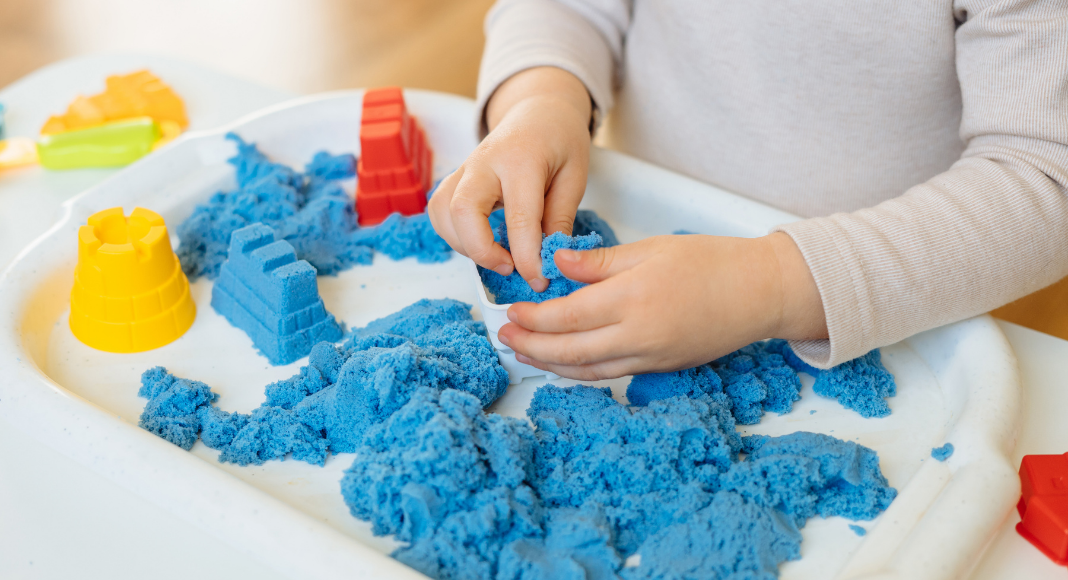 As a pediatrician, I have worked with many families dealing with Sensory Processing Disorder. Kelly Jones, another Indianapolis Moms writer, explains this disorder as “basically an abnormal neurological traffic jam where the sensory signals are not being processed into appropriate motor responses.”
As a pediatrician, I have worked with many families dealing with Sensory Processing Disorder. Kelly Jones, another Indianapolis Moms writer, explains this disorder as “basically an abnormal neurological traffic jam where the sensory signals are not being processed into appropriate motor responses.”
I have also worked with many parents and children who don’t have a formal diagnosis but noticed that paying attention to sensory needs can be super helpful in their homes.
Learning about sensory issues has even helped me understand my own feelings of overwhelm by loud noises at the end of a long day at work. And I have seen firsthand how sensory activities like playdough help my own kids calm down.
I have often referred patients to therapies for these issues, and this is often VERY helpful. But I have also found that parents frequently struggle to translate the suggestions of doctors and therapists into their daily lives. I don’t know a single parent who feels they don’t already have enough on their to-do list to fill every moment of every day. We want the best for our kids, but figuring out how to do what’s best isn’t easy.
That is where my friend JL Nichols of Parenting Sensory Kids comes in. She is an Indianapolis-based parent coach specializing in helping families who are trying to manage sensory challenges. She and I met a couple of years ago at a class for our own children. Since then, I have learned so much from her. She has a unique gift for helping parents turn challenges into opportunities. I was excited to sit down and interview her this month as I have benefitted from her talents and know many other parents will too!
Dr. Moore: How did you become interested in Sensory Processing Disorder?
JL: My first baby, who is now 10 years old, was a very difficult baby, god love her. She pretty much screamed from about 6 days old until she was around 8 months. She didn’t take bottles or solid foods well. She hated her car seat, baths, and diaper changes. She never slept. We had appointments with many doctors, but no one could pinpoint why she was struggling so much. As a toddler, her daycare, which was wonderful, had a difficult time with her as well. At about 18 months old we finally learned she was struggling with severe Sensory Processing Disorder. We did a lot of OT and parent coaching ourselves and created a plan at home and with daycare to manage her needs and we saw such amazing changes.
About the time we thought we had her all sorted and were rocking this sensory parenting life, my little boy came along. He’s six now. And he was a sensory baby, too… but the complete opposite of his sister. Where she was a sensory seeking wanting to go go go all the time and needing constant input. He was more of an avoider. He liked things calm and quiet. He hated bright lights and noise and became easily overwhelmed by his big sister.
So we had to learn how to juggle everyone’s needs, which was of course a big challenge, but slowly we figured out how to keep everyone regulated.
Dr. Moore: When did you start helping out other families?
JL: I had actually been doing it a bit all along. Sharing with other families, especially in Sensory Processing Disorder Facebook groups and online forums. I’d help mamas who were newer to the journey than we were. I’d give tips and tricks we had learned along the way and answer questions.
Then when my kids were six and two, we were at Riley Children’s Hospital for a follow-up appointment. I had brought with me a 1-page explanation of what the kids’ current diagnosis were, what we had implemented at home, and what we still needed – like I always do – and our doctor was so impressed at how we had set up our home life to help the kids thrive, she asked if I’d be interested in becoming a parent advocate and teaching other families what we were doing and how it was helping our family. I really wanted to do it. I’m so passionate about making small changes at home that really support kids like mine. But I couldn’t work the amount of hours they needed for the role. It got me thinking though, and I opened my business a few months later.
Dr. Moore: What kinds of things do you help parents with?
JL: Kids with sensory processing disorder can have a lot of different struggles going on. Therapists, doctors, and even books often have helpful ideas to try for these common challenges.
But implementing these techniques at home can be surprisingly tricky. It is hard to find professionals who can tailor their suggestions to specific families’ needs. I have learned over the years that many parents struggle with this same issue. So I now specialize in helping parents to implement practical, tailor-made solutions to the sensory issues their specific family faces.
I help parents sort out everything from managing their sensory needs, soothing and preventing meltdowns, helping the family get more sleep, eating together at mealtimes, and more. I especially love helping parents implement connection-based parenting strategies – which I highly recommend for all neurodiverse kids.
Dr. Moore: What does a typical parent coaching session look like?
JL: When a family first reaches out to me, we usually set up a zoom call. I spend a little time getting to know what the struggles are. What things they’ve already tried. You know, where are the gaps in their knowledge, and then I ask them to pick one or two goals for the family. Then we dive in and talk about strategies that can help – and how to implement them.
The implementation is the tricky part for so many families. They may have had a doctor or therapist ask them to create a set routine or a visual schedule for the child. But how do you actually do that? Maybe they don’t even have a set routine at home yet – remember so many of the families I work with are fairly sleep deprived and may have been that way for years.
And as far as the schedule itself, what kind do you need? How do you make it? Where can you find the visuals? What should be included? Where should it be kept? There are a lot of steps in creating something like that to make it actually functional and helpful. And if you spend all this time creating something and you don’t end up using it, then it’s no help at all.
At my house, we’ve been using a visual schedule for about four years. We have tried five or six different kinds. I know which ones work and which ones don’t. I know how to make one in less than an hour. I know how to figure out what should be included and what shouldn’t. Our medical professionals and therapists are so overloaded they rarely have time to help parents at this level. Plus, if they’ve never had to use one in their own homes, they don’t really know what works and what doesn’t.
So I have the family pick their biggest current struggle, and we do a deep dive into what strategies they can try and how to actually make these changes at home.
Dr. Moore: Do the families need to have a specific diagnosis or type of therapy in place before coming to you?
JL: Absolutely not. Many do and that’s great. I love working in conjunction with a team in place. Some families are just starting on this journey though. They aren’t sure what they need yet. They just know that home life is really hard, and their kiddo is struggling.
The things I teach are not just for kids with Sensory Processing Disorder, ADHD, or autism. They are solid parenting strategies that are backed by a lot of science and can help any child. Like I said, our medical system is overtaxed. There are many families on waiting lists and many more who can’t get things approved through their insurance, but they need help now. They need to at least get started.
I’ve been working through these struggles for ten years now. I’ve lost count of how many therapists we’ve worked with – over a dozen just with my kids. Countless others through the families I work with. There are things that everyone is going to have you try first. I can help you get that jumpstart.
Dr. Moore: How can families learn more about your work?
JL: They can follow me on Facebook or Instagram and message me about sensory processing disorder and other sensory concerns through either of those platforms. Or check out the Parenting Sensory Kids website.








